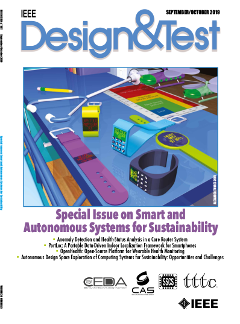
IEEE Design&Test Vol. 36, Issue 5
-
Speaker:
Smart and Autonomous Systems
- Location:
- Date: September/October
|
Highlights
|
September/October 2019 Content
From the EIC
| • | Smart and Autonomous Systems |
| View full article (PDF). |
Special Issue on Smart and Autonomous Systems for Sustainability
| • | Guest Editors’ Introduction: Smart and Autonomous Systems for Sustainability |
| We are pleased to present the special issue on “Smart and Autonomous Systems for Sustainability: Sustainable Computing and Computing for Sustainability.” We are witnessing the rise of the data-driven science paradigm, in which massive amounts of streaming data—much of it collected as a side-effect of ordinary human activity—can be analyzed to make sense and be able to make intelligent decisions for sustainability over multiple time scales (e.g., short-term versus long-term planning). read more. View full article (PDF). |
| • | Anomaly Detection and Health-Status Analysis in a Core Router System |
| Rapid error discovery is crucial for timely correction mechanisms and reliable router systems. Aiming to achieve a high degree of reliability, this article presents a machine-learning framework for analyzing router time series to evaluate the health status and detect anomalies while accounting for the important temporal characteristics of complex communication systems. read more. View full article (PDF). |
| • | PortLoc: A Portable Data-Driven Indoor Localization Framework for Smartphones |
| Editor’s note: Fingerprinting is essential for indoor navigation and localization due to its low cost, accuracy, and resiliency to multipath effects in constrained environments. This article aims to overcome the challenge of device heterogeneity and describes a portable lightweight fingerprinting framework while improving localization accuracy. read more. View full article (PDF). |
| • | OpenHealth: Open-Source Platform for Wearable Health Monitoring |
| Editor’s note: This article presents an open-source platform for wearable health monitoring. It aims to design a standard set of hardware/software and wearable devices that can enable autonomous collection of clinically relevant data. It provides reference implementations of human activity and gesture recognition applications within this platform. read more. View full article (PDF). |
| • | Autonomous Design Space Exploration of Computing Systems for Sustainability: Opportunities and Challenges |
| Editor’s note: Data-driven design methods are a promising way to design computing systems at various scales. This article presents a survey regarding data-driven techniques to design sustainable computing systems. read more. View full article (PDF). |
General Interest Papers
| • | Fault-Tolerant Systolic Array Based Accelerators for Deep Neural Network Execution |
| Editor’s note: Systolic array is embracing its renaissance after being accepted by Google TPU as the core computing architecture of machine learning acceleration. In this article, the authors propose two strategies to enhance fault tolerance of systolic array based deep neural network accelerators. read more View full article (PDF). |
| • | Design of Reversible Arithmetic Logic Unit with Built-In Testability |
| Editor’s note: This article presents an advanced reversible arithmetic logic unit with built-in testability for single bit-flip errors read more View full article (PDF). |
Departments
| • | The Last Byte: The Internet of People |
| View full article (PDF). |


